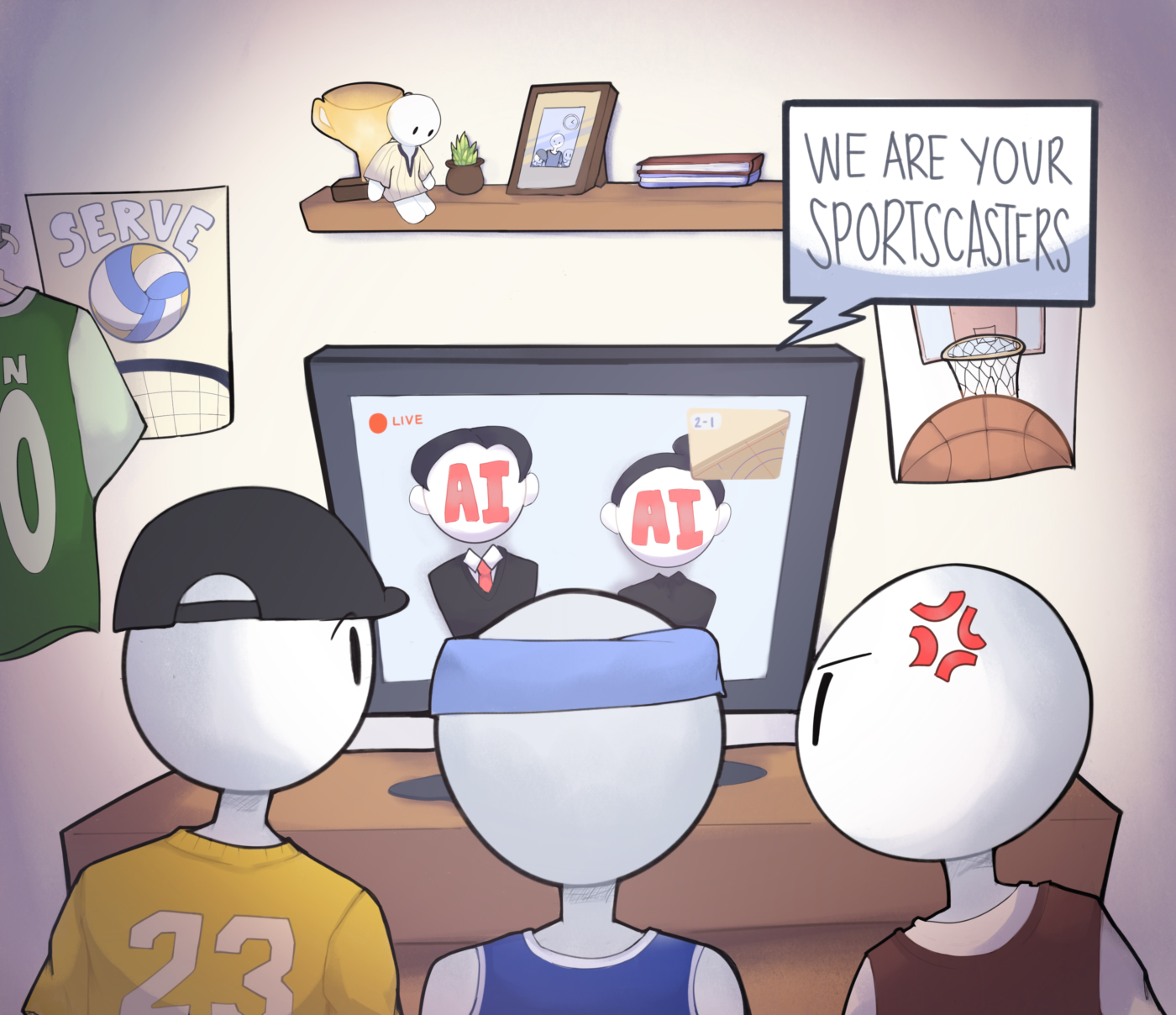DESPITE PIONEERING the use of artificial intelligence (AI) in the realm of sportscasting, seasoned sports journalists may face a roadblock in job stability in the near future.
Last September 2023, Global Media Arts (GMA) Network introduced Maia and Marco as the Philippines’ first-ever AI sportscasters. This ambitious project was revealed during the National Collegiate Athletic Association (NCAA) Season 99 Men’s Basketball opening ceremony, with the goal of enhancing the coverage of courtside reporters in the world of sports. Filipino netizens then expressed distaste and worry about the idea of AI sportscasters rolling out in the media. Such a development left an unsettling impression of what is to come for sports and its reporters.
With AI slowly finding its way to the world of sports reporting, these innovations spur a discussion on the future of the playing field. Will this be the start of an age where technology replaces the heart of sports, or will the fervor of journalism and passion for sports give rise to a force that is irreplaceably human?
In response to these prompts and how the status quo stands today, humanity is set to stand tall over technology. Humanity’s emotional delivery, passionate reportage, and building of athletes’ careers are tenets that AI cannot hope to replicate in a hundred years.
Rubbing salt on wounds
Assessing the rationale of Maia and Marco’s purpose on the “cybercourt” may lead to a deeper understanding of how the status quo proves humanity’s edge over technology. According to GMA Network’s Senior Vice President and Head of Integrated News, Regional TV, and Synergy Oliver Victor Amoroso, Maia and Marco are merely presenters, and they can never replace their veteran broadcasters who serve as the lifeblood of the network.
Seemingly following suit with GMA Network’s statement, both Maia and Marco only gave a surface-level rundown of the week during the NCAA—basically doing recaps and not full-blown sports coverage. With Maia and Marco’s role in the NCAA, one can think AI’s microscopic roles in the media will not interfere with the heart of journalism. However, it sets a dangerous precedent for those who wish to follow in the footsteps of today’s sports journalists.
Given the already sensitive climate of workforce stability with the advent of AI, the release of AI-powered sportscasters stirs unnecessary fear in both aspiring and current sports reporters. Ever since AI took the world by storm, ResumeBuilder reported that 37% of business leaders say AI replaced workers in 2023, leading to mass layoffs.
Undoubtedly, AI has already found its way into every corner of society, being used in social institutions such as the workforce, business, and the academe. However, not all fields necessitate pure robotic intellect. Some fields require an instinctive passion for bringing stories to life and humanizing the complexity of sports by connecting with both the athletes and audiences. Thus, if there is one discipline that AI cannot penetrate, it is sports reportage.
Beauty in humanity
Humans are not robots. Instantaneous calculations and their innate rationality are what the latter specializes in to accomplish objective goals, forsaking subjectivity in the process. However, what is discarded like junk by robots is what humans find gold in sports reportage—emotional intelligence.
Looking at the performance of the Philippines’ pioneer AI sportscasters Maia and Marco, the AI-duo lacked the invigorating emotion that veterans like Gretchen Ho or Boom Gonzalez brings on the broadcast. This sentiment is what rising sportscaster and former basketball professional athlete Mikee Reyes voiced in a recent interview with The GUIDON Sports.
“Emotion, for a fact, is very important in sportscasting. That is what makes sports fun, relatable, and popular—all emotions put in one [game]. With journalism, you cannot take away passion. For AI, [can they be] passionate, will they be emotional as they speak?” said Reyes.
Top-class novel humanity is clearly displayed at the top sports leagues in the world, with their commentators conveying well-timed emotions to the audience—forging a stronger connection in comparison to AI.
Momentous building blocks
Aside from boosting people’s zeal in watching the games, sportscasting also prides itself on its ability to elevate athletes’ careers. Reyes is an advocate of this practice, stating that sports announcers’ emotional delivery can sell a player’s work—an irreplaceable feeling according to the social media personality.
“Pag sinisigaw niya pangalan mo, tatatak ka [with the audience]. Underrated sa career ng mga player ang commentators,” emphasized Reyes.
(When they’re shouting your name, you’ll make a mark on the audience. Commentators are really an underrated part of a player’s career.)
Once a player builds good rapport with a reporter, the athlete can benefit from this connection by focusing on their production on the court., These moments are some of the small things which can help give unbounded confidence to the players on the floor.
Setting aside all the differences between the various sports media companies, one important caveat remains: Everyone in the industry has this shared passion and love for the game. Every single fan exudes this deep affection for sports, which results in a natural and profound connection between the sportscaster and the audience.
Doubling down on Reyes’s notion of human passion, casting any sports match can evidently affect the viewing experience of the fans. In most NBA enthusiasts’ minds, Breen’s iconic “double bang” call on Stephen Curry’s long-range game-winner against the Oklahoma City Thunder is one of the most remarkable moments in sports history. Holding a special place in most football fanatics’ hearts is Peter Drury’s emotional “Aguerooo” commentary when Sergio Aguero’s late-game goal won Manchester City the tight 2012 Premier League title race. These iconic moments would not be labeled as such if not for these great sportscasters who have dedicated their lives to mastering the art of their craft.
Considering how the likes of Breen and Drury deliver their commentaries, human sports reporters’ fervor evidently goes full throttle. Apart from syncing their technical knowledge, the stories of all players on the court, and analyzing the game all in real-time, they are also required to give off the right emotion—a unique skill for those behind the microphones. Undoubtedly, this seemingly antithetical relationship devoids the robotic rigor of what is only found in the hearts of human sportscasters—a soul for the sport.
The sporting horizon
The transcendent connection between sports fans, the audience, and those in sports media is indeed still assured of its throne today—but for some, tomorrow is not certain. Fearing the future of sports media, Reyes said that despite all that he feels for the situation, he dreads the day that robots could eventually have the same way of thinking as them.
Nonetheless, it is unlikely that the imminent arrival of technological advancement will ever overtake humanity’s innate desire to adapt and overcome. The touch of humanness in reporting is paramount which AI’s pinpoint accuracy cannot compensate for in any way.
Reyes further emphasized that the human drive to achieve their ultimate dream and end goal in life can be the X-factor in this debate. “No AI can replace human sportscasters, especially passionate ones. Continue to dream about covering sports, and you may be the kid that will replace me in the future,” he stated.
Undoubtedly, desire is an invaluable treasure that only human beings are capable of. Not even a hundred years’ worth of AI advancement can hold a candle to the willpower that aspirations ignite, for human progress is an asset that moved nations, leaders, and thinkers to build societies that survived the test of time.
The humanity, emotions, and stories behind sports are only a fraction of how promising progress can be in the hands of the people. Thus, these feats are an irreplaceably human triumph that AI can never even hope to recreate.







